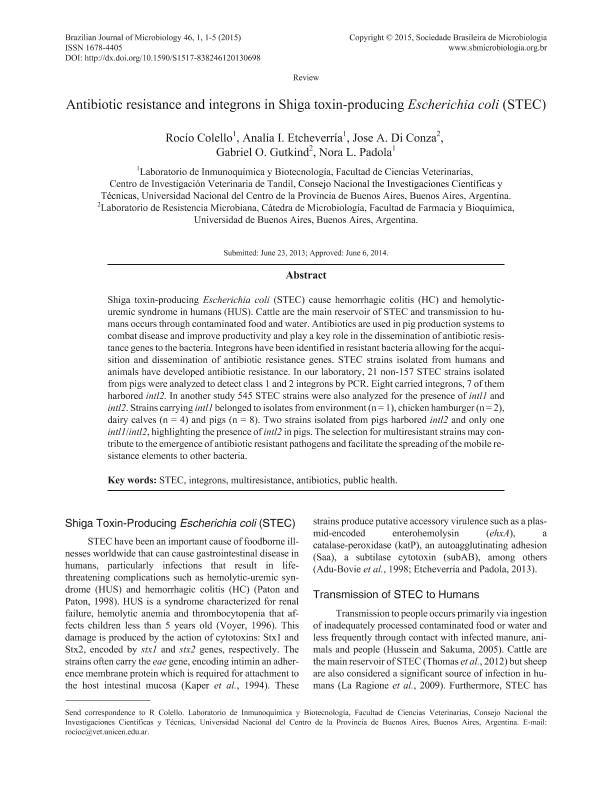Artículo
Antibiotic resistance and integrons in shiga toxin-producing escherichia coli (STEC)
Colello, Rocío ; Etcheverría, Analía Inés
; Etcheverría, Analía Inés ; Di Conza, José Alejandro
; Di Conza, José Alejandro ; Gutkind, Gabriel Osvaldo
; Gutkind, Gabriel Osvaldo ; Padola, Nora Lía
; Padola, Nora Lía
 ; Etcheverría, Analía Inés
; Etcheverría, Analía Inés ; Di Conza, José Alejandro
; Di Conza, José Alejandro ; Gutkind, Gabriel Osvaldo
; Gutkind, Gabriel Osvaldo ; Padola, Nora Lía
; Padola, Nora Lía
Fecha de publicación:
07/2015
Editorial:
Sociedade Brasileira de Microbiologia
Revista:
Brazilian Journal of Microbiology
ISSN:
1517-8382
e-ISSN:
1678-4405
Idioma:
Inglés
Tipo de recurso:
Artículo publicado
Clasificación temática:
Resumen
Shiga toxin-producing Escherichia coli (STEC) cause hemorrhagic colitis (HC) and hemolyticuremic syndrome in humans (HUS). Cattle are the main reservoir of STEC and transmission to humans occurs through contaminated food and water. Antibiotics are used in pig production systems to combat disease and improve productivity and play a key role in the dissemination of antibiotic resistance genes to the bacteria. Integrons have been identified in resistant bacteria allowing for the acquisition and dissemination of antibiotic resistance genes. STEC strains isolated from humans and animals have developed antibiotic resistance. In our laboratory, 21 non-157 STEC strains isolated from pigs were analyzed to detect class 1 and 2 integrons by PCR. Eight carried integrons, 7 of them harbored intl2. In another study 545 STEC strains were also analyzed for the presence of intl1 and intl2. Strains carrying intl1 belonged to isolates from environment (n = 1), chicken hamburger (n = 2), dairy calves (n = 4) and pigs (n = 8). Two strains isolated from pigs harbored intl2 and only one intl1/intl2, highlighting the presence of intl2 in pigs. The selection for multiresistant strains may contribute to the emergence of antibiotic resistant pathogens and facilitate the spreading of the mobile resistance elements to other bacteria.
Palabras clave:
Antibiotics
,
Integrons
,
Multiresistance
,
Public Health
,
Stec
Archivos asociados
Licencia
Identificadores
Colecciones
Articulos(CIVETAN)
Articulos de CENTRO DE INVESTIGACION VETERINARIA DE TANDIL
Articulos de CENTRO DE INVESTIGACION VETERINARIA DE TANDIL
Articulos(OCA HOUSSAY)
Articulos de OFICINA DE COORDINACION ADMINISTRATIVA HOUSSAY
Articulos de OFICINA DE COORDINACION ADMINISTRATIVA HOUSSAY
Citación
Colello, Rocío; Etcheverría, Analía Inés; Di Conza, José Alejandro; Gutkind, Gabriel Osvaldo; Padola, Nora Lía; Antibiotic resistance and integrons in shiga toxin-producing escherichia coli (STEC); Sociedade Brasileira de Microbiologia; Brazilian Journal of Microbiology; 46; 1; 7-2015; 1-5
Compartir
Altmétricas



